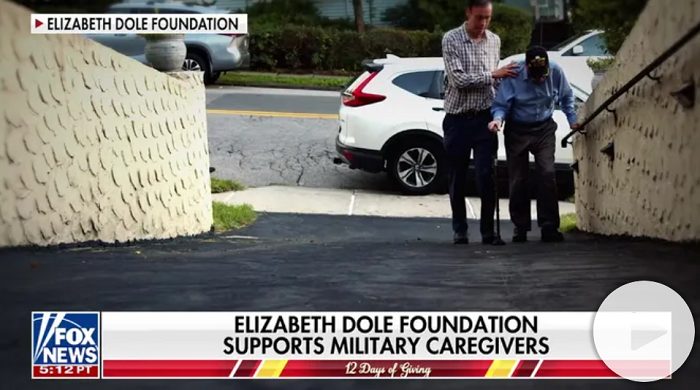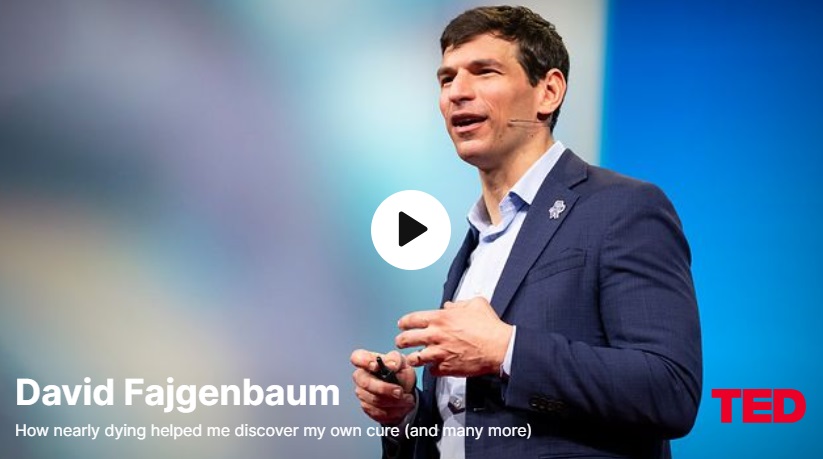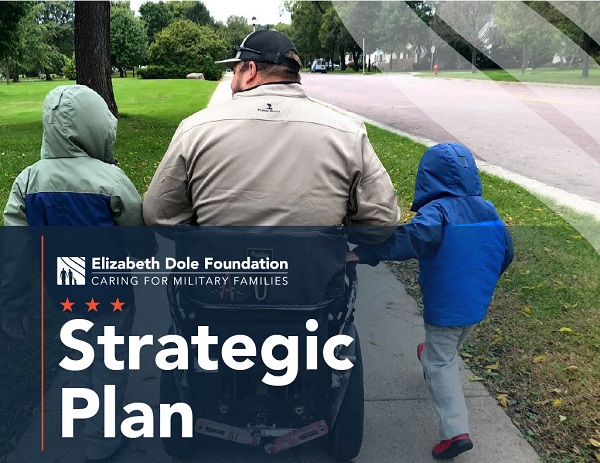2019 MCLC Recap From Bob McDonald
Publish On : March 27, 2019
Publish On : March 27, 2019

The McDonald Conference for Leaders of Character began in 2012 with the vision of being the premier transformative, short-duration leadership experience for young, emerging global leaders who unite together with preeminent world leaders in an enduring partnership. The conference has been hosted each year by the Department of Behavioral Sciences and Leadership. Since its inception, the event has touched the lives of over 600 students and senior leaders through its exploration of relevant and timely themes. Past Conference themes include:
1. 2018 – Making Ripples: Character, Ideas, and Teams;
2. 2017 – Opposition & Innovation: Taking Risks to Lead Change;
3. 2016 – From Failure to Inspiration and Change;
4. 2015 – Cross-Cultural Competence;
5. 2013 – Responsibility; and
6. 2012 – Leading in an Interconnected World.
Diane and my planning for the conference began around 2010. It is hard to believe we have been at this for nine years.
Student Attendees Both Domestic and Abroad
This year’s conference included students from over thirty domestic universities, including the California Institute of Technology, Columbia, Cornell, Dartmouth, Duke, Howard, MIT, Northwestern, Ohio State, Penn State, Princeton, Rice, Stanford, Texas A&M, Tufts, Florida, Nebraska, Penn-Wharton, University of Texas-Austin, Virginia Tech, Wake Forest, Williams, Yale, all of the U.S. military academies, and more. We also had students from schools abroad—Australia, Brazil, Canada, China, Czech Republic, Egypt, India, Malaysia, Mexico, Norway, Puerto Rico, Saudi Arabia, Singapore, South Africa, Spain, Switzerland, and the United Kingdom.
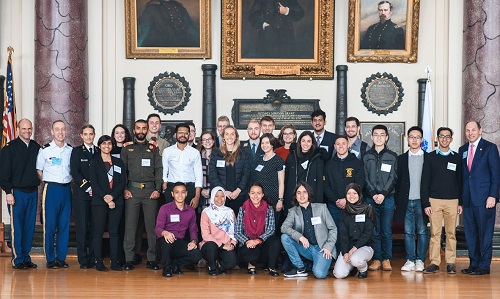
2019 Senior Fellows
This year’s Senior Fellows include Sandy Alderson of the Oakland Athletics; Jeri Eckhart-Queenan, Partner of the Bridgespan Group; Leslie Fenwick, Dean Emeriti of Howard University; Iqbal Kassam, Founder and Chairman of the Zynik Capital Corporation; Rob Lively, Retired Army Command Sergeant Major; Jean-Francois Manzoni, Professor and President of IMD; Denis McDonough, Chief of Staff for President Obama; Lisa Shalett, Retired Partner of Goldman Sachs; Lieutenant General Nadja West, Surgeon General of the Army and West Point Class of 1983; and Pat Swygert, President Emeritus of the State Universities of New York and Retired President of Howard University. Our two guest speakers are Brian Stevens, Chief Technology Officer of Google Cloud; and Jack Ma, Founder and Chairman of Alibaba. We were thrilled with this line-up.
Thursday Highlights
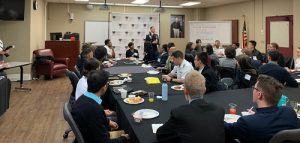 Thursday morning, I joined the group of International Student Fellows in the lobby of the Thayer Hotel. We all took a bus to Thayer Hall, one of the main academic buildings on the West Point campus, where we had breakfast with the Cadets leading the conference and the faculty of the Department of Behavioral Sciences & Leadership. Major A. J. Steinlage welcomed everyone. One of the Cadets led an ice breaker. Each team had a sheet you had to fill out by knowing other people in the room, i.e. who speaks more than two languages? Colonel Everett Spain, Department Head, spoke. He called on me to speak. I welcomed everyone, and talked about how we conceptualized the conference, and I challenged the group to make the most of the conference—invest and they will get back, seek out and get to know someone who doesn’t look like you, collaborate to help solve some of the world’s knottiest problems, and stay connected after the conference ends.
Thursday morning, I joined the group of International Student Fellows in the lobby of the Thayer Hotel. We all took a bus to Thayer Hall, one of the main academic buildings on the West Point campus, where we had breakfast with the Cadets leading the conference and the faculty of the Department of Behavioral Sciences & Leadership. Major A. J. Steinlage welcomed everyone. One of the Cadets led an ice breaker. Each team had a sheet you had to fill out by knowing other people in the room, i.e. who speaks more than two languages? Colonel Everett Spain, Department Head, spoke. He called on me to speak. I welcomed everyone, and talked about how we conceptualized the conference, and I challenged the group to make the most of the conference—invest and they will get back, seek out and get to know someone who doesn’t look like you, collaborate to help solve some of the world’s knottiest problems, and stay connected after the conference ends.
Thayer Hall is mostly underground. It is built on the side of the hill that leads down to the Hudson River. During earlier generations it was the riding arena of West Point. So, George Patton worked on his participation in the Olympic pentathlon in this riding arena. Our joke when we had class there was that it still smelled like a stable. It doesn’t.
We went to Cullum Hall for lunch. Cullum Hall was built using a bequest of $250,000 by former Superintendent and Civil War General George Cullum, who worked to establish the Association of Graduates over his lifetime. He’s the one who established the Cullum system, where each graduate is given a number based on class rank from the first graduate being 1 to the last. Cullum Hall is a monument to those who fought in the Civil War. There are great oil portraits of many Civil War Generals, who are graduates. There is also a room on the first floor that honors those West Point graduates who have lost their lives in combat, and those who have been awarded the Medal of Honor.
After lunch we used the upstairs Cullum Hall ballroom to do some improvisational experiences to warm up the International Student Fellows, help them get to know each other, and build trust with each other. We used a professional improvisational performer from New York City. He was adept at working with the students in pairs and as teams. Each team presented a skit of a new product they were selling. After that each Cadet took a group of Student Fellows on a tour of the Academy. We were a bit hampered by the weather, which was rainy and cold.
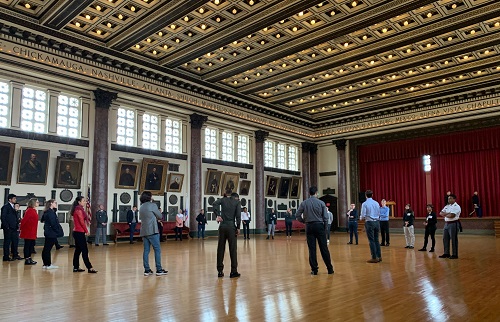
We had dinner for our Student Fellows in the Mess Hall with the Corps of Cadets. The Mess Hall, which is in Washington Hall, is where all 4,000 of the Corps of Cadets eat at one time. Thursday night was “spirit night” for the Corps. The pep band played from the Poop Deck, and the Corps was dressed in spirit clothes. After dinner we went to Arvin Gym, where we broke into two groups for two activities—wall climbing and salsa dancing lessons. The activities were led by the Cadets who lead the respective clubs—climbing and dancing. Both activities were a big hit.
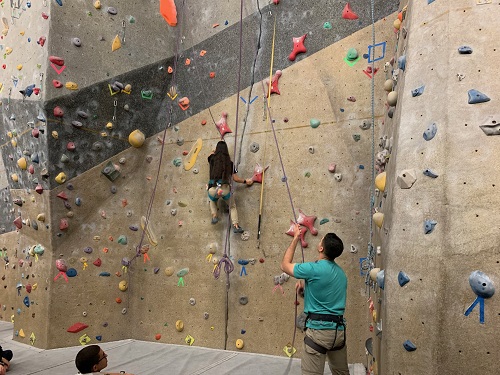
Friday Highlights
Friday morning, we met in the lobby at 7:30 a.m. Buses took us to Ike’s Café in Eisenhower Hall. Everett Spain and the Cadet in Charge, Cadet Ta’Nia Nash, welcomed everyone. I spoke briefly and talked about why we started the conference. Lieutenant Colonel Woodruff spoke about the Leader Development System at West Point while the Fellows ate breakfast. Afterward we went upstairs to the auditorium of Ike Hall for the Core of the Corps exercise. This is where we put the Student and Senior Fellows inside the West Point Band on the stage of Ike Hall and use the performance of the band to tease out insights of leadership. We tease out the importance of inspiration in leadership and how music inspires. We show the importance of outstanding virtuoso performance but also the importance of collaboration and team work. We ask a couple of the Student Fellows to direct the orchestration. We talk about the importance of asking others for advice and listening to the feedback of your team members. We use “The West Point March” to show how multiple songs of West Point can be played in harmony and complimentarily for effect.
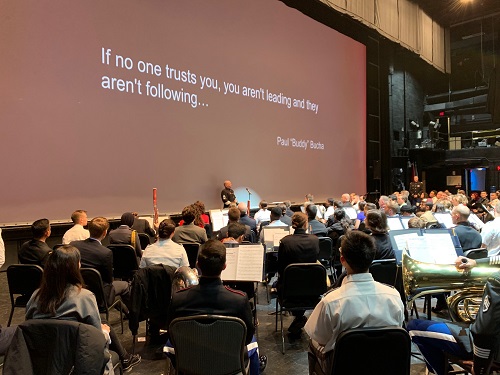
We took a group picture in the seats of Ike Hall, given the bad weather outside. We took transportation to Washington Hall, where we watched the Cadets form up for lunch. We had lunch with the Cadets in the Mess Hall. Afterward we walked to the Jefferson Library, where we continued the conference in the Haig Room, on top of the library. Cadet in Charge Nash and Colonel Spain spoke again.
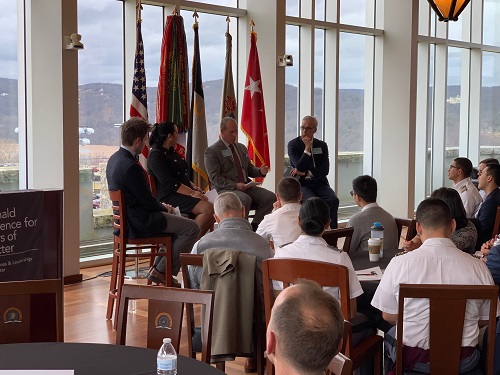
We conducted our first panel discussion about Making Decisions in a Technology-Driven World. The panelists were Dr. Leslie Fenwick, Rob Lively, and Denis McDonough. Dr. James Cornwell of the Department of Behavioral Sciences & Leadership moderated. A few insights included:
1. Making sure we graft technology onto solid values and purpose,
2. Making sure we develop the soft skills to go with the hard skills of technology,
3. Making sure we are humble leaders with vision,
4. Don’t allow technology to be distracting from the mission or leadership presence,
5. The importance of transparency in the use of technology and not using technology only to confirm our bias.
We then broke into our nine teams, each with its own Senior Fellow, to discuss the panel and topic.
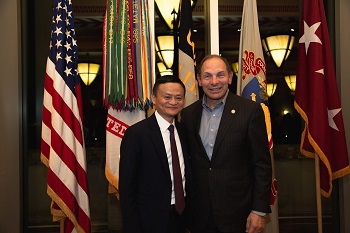 After 5 p.m. we gathered the Senior Fellows in a separate room to meet with our evening guest speaker, my friend Jack Ma. Jack is the Founder and Executive Chairman of Alibaba, one of the ten largest companies in the world. Jack is an amazing leader. He grew up in Hangzhou, China. To learn English, he would stand outside hotels that catered to foreigners and offered to guide them on tours of the tourist city. Jack went to college to be a teacher. He started Alibaba, which is like Google, Facebook, and Amazon combined, in China. P&G was Alibaba’s largest supplier. I knew Jack through my work at P&G and Chairmanship of the U.S. – China Business Council. I had Jack speak to the top leaders of P&G in 2011.
After 5 p.m. we gathered the Senior Fellows in a separate room to meet with our evening guest speaker, my friend Jack Ma. Jack is the Founder and Executive Chairman of Alibaba, one of the ten largest companies in the world. Jack is an amazing leader. He grew up in Hangzhou, China. To learn English, he would stand outside hotels that catered to foreigners and offered to guide them on tours of the tourist city. Jack went to college to be a teacher. He started Alibaba, which is like Google, Facebook, and Amazon combined, in China. P&G was Alibaba’s largest supplier. I knew Jack through my work at P&G and Chairmanship of the U.S. – China Business Council. I had Jack speak to the top leaders of P&G in 2011.
Jack was an inspiring speaker. He is retiring from Alibaba to focus on philanthropy. Jack is all about purpose, values, and businesses doing good, as well as, doing well financially. He inspired the audience. Jack was eager to study the Leadership Development System at West Point, and he credits leadership development for Alibaba’s success. He talked about the importance of purpose to Alibaba, and doing good not just doing well financially. While Jack acknowledged the advantages of technology, he also talked about how unique humans are with hearts.
After dinner we went to Cullum Hall for a reception and DJ music. The student from Duke was keeping me updated on Duke’s NCAA Tournament game against North Dakota State. Duke won 85 to 62. When I got back to my room, I called Diane. She had made so much progress that she and Mimi were leaving on Saturday to drive to Orlando. Diane reported we had a couple come see the house for a second time. Diane showed them around. We are hoping for an offer.
Saturday Highlights
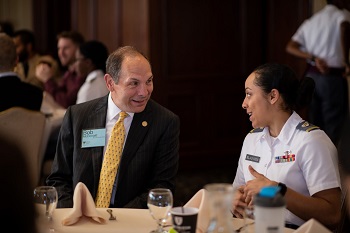 Saturday morning, we met in the lobby, and a bus took us to the Haig Room of the Jefferson Library. We ate breakfast. After breakfast we conducted the second panel discussion about Developing Character in a Technology Driven World. The panelists were LTG West, Jean-Francois Manzoni, and Jeri Eckhart-Queenan. The panel moderator was Dr. Mike Matthews of BS&L. The key insights from the panel were: 1) developing character is a lifelong journey that requires constant attention, 2) be mindful that there are many forks in the road, don’t get distracted and choose the wrong road, 3) be a lifelong learner, 4) integrate learning and experience to get wisdom; and 5) be a force for good. After the panel we again broke into small groups to discuss the issue.
Saturday morning, we met in the lobby, and a bus took us to the Haig Room of the Jefferson Library. We ate breakfast. After breakfast we conducted the second panel discussion about Developing Character in a Technology Driven World. The panelists were LTG West, Jean-Francois Manzoni, and Jeri Eckhart-Queenan. The panel moderator was Dr. Mike Matthews of BS&L. The key insights from the panel were: 1) developing character is a lifelong journey that requires constant attention, 2) be mindful that there are many forks in the road, don’t get distracted and choose the wrong road, 3) be a lifelong learner, 4) integrate learning and experience to get wisdom; and 5) be a force for good. After the panel we again broke into small groups to discuss the issue.
After lunch we had the third panel, which was moderated by Dr. Steve Condley of BS&L. Panelists were Lisa Shalett, Iqbal Kassam, Sandy Anderson, and Pat Swygert. Their topic was Leading Innovation in a Technology Driven World. Key insights included:
1. Make sure people know why they are doing what they are doing,
2. Keep up with the pace of change,
3. Make sure you make time to reflect,
4. Use reverse mentoring to stay current and knowledgeable,
5. Authenticity creates trust and character, and
6. Be curious.
After the discussion we again broke into small groups.
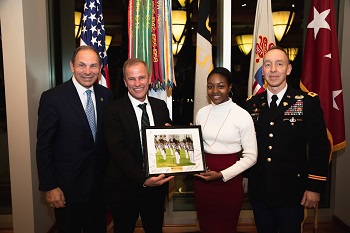 Our evening speaker was Brian Stevens, Chief Technology Officer of Google Cloud. Brian talked about his journey in the industry and at Google. He talked about the changes in technology he had witnessed, from large mainframes to time sharing terminals to PC’s to phones; and the changes he had to make to stay relevant in the industry.
Our evening speaker was Brian Stevens, Chief Technology Officer of Google Cloud. Brian talked about his journey in the industry and at Google. He talked about the changes in technology he had witnessed, from large mainframes to time sharing terminals to PC’s to phones; and the changes he had to make to stay relevant in the industry.
Sunday Highlights
Sunday morning, we gathered in the Grant Room of The Thayer Hotel for our closing breakfast. President Pat Swygert, former President of Howard University and SUNY, gave a passionate talk about his father, who was educated to only the third grade, and his grandfather, who was a slave in North Carolina. His point was not about pride in himself, but rather how each succeeding generation builds from the past and can solve the problems of the future. I spoke about each Student Fellow paying it forward, as Don Quixote did for Dulcinea. Don Quixote treated a wrench, bar maid, prostitute Aldonza as if she was a princess named Dulcinea. So Dulcinea behaved like a princess, and when Don Quixote died, she refused to revert to her old ways. Don Quixote, who some thought was mad, improved the life of another by treating her with respect and inspiring her to seek great things.
